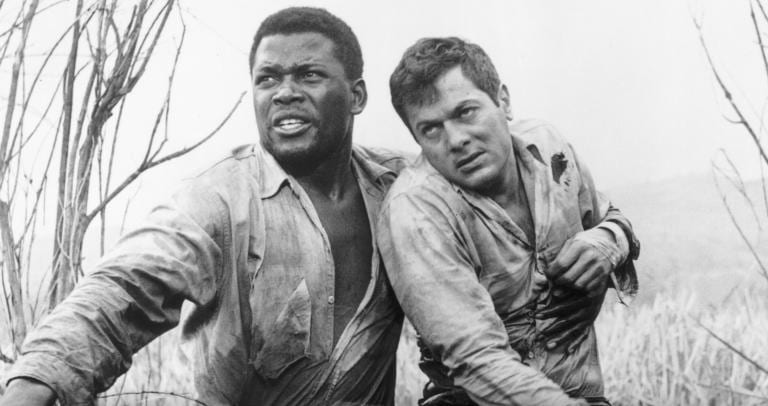The latest in a month-long series of re-posts from my Facebook marathon in April 2020.
–
Sidney Poitier marathon part 5 (1958):
Poitier got the first of his two Oscar nominations for his co-starring role in The Defiant Ones (1958), and it’s not hard to see why. Poitier plays one of two escaped convicts — the other is played by Tony Curtis — who are chained together and have to overcome their mutual animosity, much of it fueled by racism, in order to survive. Because the two fugitives can’t get away from each other, they have plenty of opportunities to learn about each other, get on each other’s nerves and, eventually, find some kind of rapport, all of which makes for good drama — and both Poitier and Curtis rise to the occasion admirably.
It should be noted that Curtis was nominated for an Oscar, too — it was his only nomination ever — and in some ways his is the slightly larger role. About two-thirds of the way into the story, Curtis and Poitier meet an abandoned mother who gives them the tools they need to break free of the chain that binds them together, and Poitier fades from the story somewhat while the woman has a fling with Curtis. (There’s a close-up of the woman’s hand touching Curtis’s arm and chest that is very female-gaze-y.) But when Curtis learns that Poitier has left and the woman gave Poitier bad directions that will certainly lead to his doom (due to the swamps and such), Curtis angrily leaves the woman and goes to save Poitier, and so the two men are together again when the police finally catch up with them.
But if Curtis has the slightly larger role — commensurate, perhaps, with the fact that he was the more established movie star at the time (this film came out between 1957’s Sweet Smell of Success and 1959’s Some Like It Hot) — it was Poitier’s nomination that made history, as he became the first black man to be nominated for a competitive Oscar. (Hattie McDaniel had won best supporting actress for 1939’s Gone with the Wind, James Baskett had been given an honorary Oscar for playing Uncle Remus in 1946’s Song of the South, Ethel Waters had been nominated for best supporting actress for 1949’s Pinky, and Dorothy Dandrige had been nominated for best actress for 1954’s Carmen Jones.) Curtis and Poitier were both nominated in the lead-actor category, and they lost to David Niven for Separate Tables — but Poitier would get another shot at the trophy before long.
A few quick points:
— This was the first of three Poitier films (co-)directed by Stanley Kramer.
— Poitier’s character sings over the opening credits and sings again on one or two other occasions. Is that Poitier’s actual voice? I ask because Wikipedia says Poitier’s career suffered a bit at first because his tone deafness made it impossible for him to sing. If he is being dubbed here, it is much less obvious than it was in 1957’s Band of Angels.
— Love the look on Poitier’s face when Curtis tells the lynch mob, “You can’t lynch me, I’m a white man.” After all Poitier and Curtis have been through together…?
— The film famously ends with Poitier trying to help Curtis leap onto a moving train, and jumping/falling off the train when Curtis fails to grab his hand. I notice, though, that Curtis reaches for Poitier with his left hand, which seems odd because Curtis was shot in his left shoulder just a few scenes earlier. Is that really the arm that Poitier would have grabbed to hoist him up?
— The African-American film scholar who introduces the Poitier series on the Criterion Channel notes that the ending has always rung false for black Americans, who can’t believe that Poitier would have given up his chance for freedom to be with Curtis. It is not clear to me, though, that Poitier gets off the train intentionally; it seemed to me that he could have slipped off accidentally because he was reaching for Curtis. In any case, the film does establish a dramatic reciprocity here, because Curtis has already given up his own chance for freedom — driving off with the divorced mother — in order to save Poitier’s life. Is it realistic that Poitier would have returned the favour? Perhaps not, but it makes a dramatic kind of sense.
The only other Poitier film that year was Our Virgin Island (1958), which stars John Cassavetes and Virginia Maskell as an American man and a British woman who meet on a beach in the British Virgin Islands and decide, quite impulsively, to get married, buy an island and live on love. Poitier — who co-starred with Cassavetes in 1957’s Edge of the City — has a supporting role as a handyman of sorts who speaks with a thick Jamaican accent. Ruby Dee, who had been in three earlier movies with Poitier and would appear in two more, also pops up very, very briefly as Poitier’s significant other.
–
Sidney Poitier marathon part 6 (1959-1960):
After almost a decade of working his way up the Hollywood ladder, Sidney Poitier finally got top billing in a film — and it was a film he did not want to be in. Indeed, Wikipedia says the only reason Poitier agreed to star in Porgy and Bess (1959), an adaptation of the George Gershwin musical, is because the producers threatened him with a lawsuit. (Apparently Poitier’s agent told the producer she could convince him to do the movie, and the producer took this to be the equivalent of an oral contract.)
That’s just one of many behind-the-scenes stories that are far, far more interesting than the film itself. While on paper you might think that there was something progressive for that era about top Hollywood talent making a major musical with an all-black cast, Porgy and Bess was a troubled, controversial production — turned down by some black actors because the story was full of drugs, rape, murder and other things that cast the African-American community in a less-than-positive light, and resisted by others for much more personal reasons (e.g. leading lady Dorothy Dandridge was distressed when Otto Preminger took over as director because she had had an affair with him a few years earlier and had aborted their child under pressure from the studio, and possibly under pressure from Preminger himself; what was it like when she had to take direction from him during the film’s rape scene, I wonder…).
All of the sturm und drang behind the scenes resulted in a film that audiences didn’t want to see, and after the movie flopped, the Gershwin estate asked the producers to destroy all copies of the film, and to this day it is not known whether any quality prints survived. According to Wikipedia, the film has never had a home-video release, and it is widely considered one of the most expensive and prestigious “missing films”.
Poor-quality videos do exist online, though, and I was able to watch one of them, but I am not familiar with the original musical and I’m afraid I don’t have much to say about the film itself, especially given my current focus on Poitier. Once again, he didn’t do any of his own singing — that’s someone else’s voice we hear — and because his character is crippled and has limited mobility, there are entire sections of the film (such as a church picnic on an island) in which his character never appears.
I did recognize a few of the songs, though, and was struck by the fact that ‘It Ain’t Necessarily So’ — the song that questions the veracity of several Bible stories — is sung by a dope peddler played by Sammy Davis Jr who basically crashes the church picnic. Also, the guy who rapes Bess is played by future Starfleet admiral Brock Peters, who would go on to play a man who is falsely accused of rape in 1962’s To Kill a Mockingbird.
One year later, Poitier was back to second-billing status, this time behind Alan Ladd, in the Korean War movie All the Young Men (1960). The film concerns a platoon that needs to take and hold a mountain pass, and Poitier plays a sergeant who assumes command of the platoon after their lieutenant dies — and the sergeant’s job is made somewhat difficult by the fact that one or two of the troops serving under him are a wee bit racist.
All the Young Men is a fairly short, brisk film — only 82 minutes — and it’s got some really nice suspense and some striking camera angles. During one early battle scene, the camera is underwater and looking up at the ice when a face with a bloodied eye socket comes crashing through; and the film ends on an almost giddy note, with airplanes coming to the platoon’s rescue and Poitier firing a machine gun in the camera’s general direction as a jazzy version of ‘When the Saints Come Marching in’ starts playing on the soundtrack.
To be honest, I kind of like seeing how Poitier fared in these genre pics more than I like watching his Serious Social Message movies. But that’s not to say the film doesn’t have some serious social themes of its own: Like a lot of war movies, it revolves around an ethnically diverse military unit (the platoon counts a Navajo and a Swedish immigrant among its ranks), and the film does take place only two years after President Truman formally abolished racial segregation in the U.S. military. Near the end, one of the white marines needs a blood transfusion, and it turns out Poitier is the only surviving member of the team with a matching blood type — and so the point is made that our common humanity is more important than our differences in appearance.
It must be said, though, that as sensitive as the film is on racial matters, it is a little jarring how the film’s one major Korean character is played by an Argentinian woman with Vulcan eyebrows. I mean, we are told that this character is part-French, but still…
Other cast members include teen idol James Darren and comedian Mort Sahl, the latter of whom appears to be improvising a scene in which his character tells his fellow marines an amusing story.
Oh, and speaking of Star Trek: Apparently the film’s story was conceived with a bit of help from Gene Coon, who went on to be the showrunner on Star Trek and played a big part in creating the Klingons, Khan, the Prime Directive and so on. Also, the actor who plays the marine with medical training is played by Glenn Corbett, who went on to play Zefram Cochrane, inventor of the warp drive, in a 1967 episode of the original series.
–
The image above shows Sidney Poitier and Tony Curtis in The Defiant Ones.















